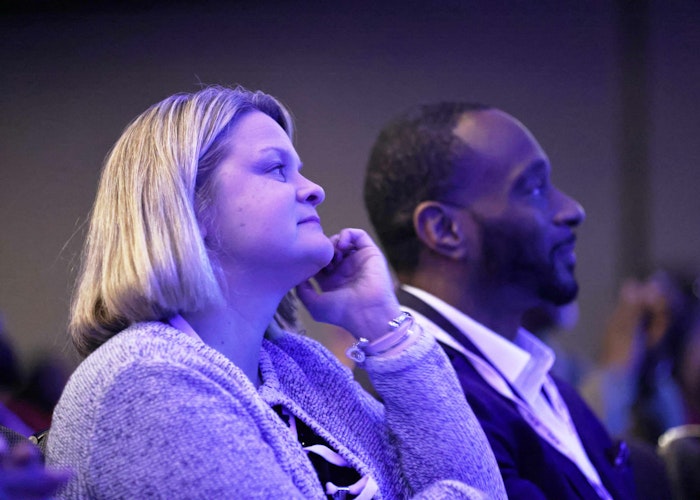2024 Annual Meeting
Developing and Submitting a Proposal
The call for proposals is now closed.
Notifications will be sent out the week September 18.
Developing and Submitting a Proposal
The online proposal form included the following fields:
- Presenter name(s), session title, institution name, and professional title and email address of each facilitator
- Meeting Track
- Session Format
Information to Include when Submitting a Proposal
The abstract should describe the content and significance of the session and its format and how the audience will be engaged. Be sure to include new information, examples of innovation, and proven results. Please format your abstract into the following sections:
- Anticipated learning outcomes for participants
- Background and evidence of the effectiveness of the work being presented
- Takeaways from your session that are applicable to attendees
- Plan for participant interaction for Discussion Sessions
- For Discussion Sessions, please provide the guiding questions for the discussion.
Provide a short description to be used in promotional materials and in both the meeting program and the mobile app. Please remember that—should your proposal be accepted—a participant’s decision to attend your session will be based, in large part, on this description. It should be accurate and as compelling as possible.
Describe or list the outcomes with which you hope the audience members will leave the session (i.e., the “takeaways”).
Writing a Strong Proposal
The proposal process is highly competitive. Priority was given to proposals that:
- draw on the work of multiple institutions, of consortia, or campus-community partnerships;
- reflect diverse disciplinary or programmatic perspectives;
- reflect the pluralism of campus communities and include presenters who bring diverse perspectives and life experiences;
- demonstrate work that has been proven effective and has advanced well beyond the planning stage;
- highlight current work, recent findings, fresh viewpoints, and curricular or institutional innovations;
- illustrate the perspectives of various organizational roles (e.g., faculty members, department chairs, deans, provosts);
- address the challenges and obstacles encountered—not just the successes.
Sessions should explicitly address and encourage translation or adaptation to other institutional or professional settings. “Show and tell” submissions from single institutions that have little or no applicability to other institutional contexts will not be accepted. Please consider the number of panelists carefully to ensure adequate time for dialogue.
Proposals that refer to the presentation as “this paper” will not be accepted. Presenters who read papers will not be considered for future sessions. Anyone listed in the proposal as a presenter will be expected to attend and present at the meeting.
Meeting Tracks
This track will focus on improving student outcomes, advancing equity goals, and addressing the implications of AI through innovations in teaching, learning, and assessment; curricular design; and the application of digital technologies in the liberal arts and STEM fields.
This track will focus on reclaiming the narrative on equity and what it means to support the success of all students.
This track will focus on advancing the public purposes of higher education by leveraging engaged forms of learning—global, civic, STEM-related, and community-based learning.
This track will focus on links between liberal education outcomes and workforce readiness and on how integrating the arts and humanities with the sciences can empower students and promote economic growth and global competitiveness.
This track will focus on ways colleges and universities can support the mental health and well-being of their students, faculty, and staff.
Session Formats
Sessions will be 10*, 30, 60, or 75 minutes in length.
*HEDs Up sessions are the only format with 10-minute presentations.
Multiple 10-minute presentations, within a one-hour session, modeled on the format of TED Talks. Each presentation should focus on an innovative project or program, compelling research, or “lessons learned.” HEDs Up presentations should be provocative, challenging, entertaining, and above all, interesting.
Explore current work, recent findings, or new perspectives and allow at least 20 minutes for discussion.
Follow a traditional format with a presentation(s) followed by discussion among the speakers and with the audience.
Present findings, works in progress, or new methodologies pertaining to the meeting themes.
Provide opportunities for participants to share successful strategies and examples of effective academic and institutional leadership and/or change at all levels. For these informal discussions, participants are welcome either to rotate among several discussion topics or to focus on one only.
Active-learning sessions—limited to 25 participants each—that focus on topics currently being discussed and debated within higher education. Seminar leaders pose provocative questions and introduce activities that engage participants in workshop-style activities.
Additional Information
The deadline to submit proposals was Friday, July 7, 2023, at 11:59 p.m. ET.
Notifications
The primary session contact will receive an email message indicating the decision on the proposal the week of September 18.
Registration Fees
All presenters are responsible for paying the appropriate registration fees. Please be sure all presenters submitted in your proposal have this information.
A Special Note Regarding Proposals from Non-Campus Practitioners
AAC&U values the insights from both inside and outside the higher education campus community. Non-campus practitioners (e.g., non-profit, for-profit, association, consultant, etc.) interested in participating as presenters at the AAC&U Annual Meeting are encouraged to either submit a proposal for peer review or contact the AAC&U Office of Advancement at [email protected] regarding sponsored session options.
Sessions submitted via the call for proposals will be reviewed by the program director and the conference planning committee. If accepted, session presenters are responsible for covering their own conference registration fees, travel expenses, etc. There are no additional fees associated with this sponsored session type.
Sessions submitted via the AAC&U Office of Advancement ([email protected]) are considered sponsored sessions and require executive approval. Please note that this is a paid sponsorship option. Sponsored session presenters are required to adhere to all meeting guidelines regarding session format and expectations.

Questions?
For questions or additional information about the Annual Meeting, please email [email protected].